Despite the devastation that has struck this tiny mountain nation, Dr Vani Kori -- who volunteered her service in Nepal for 10 days -- believes it will soon rebuild itself.
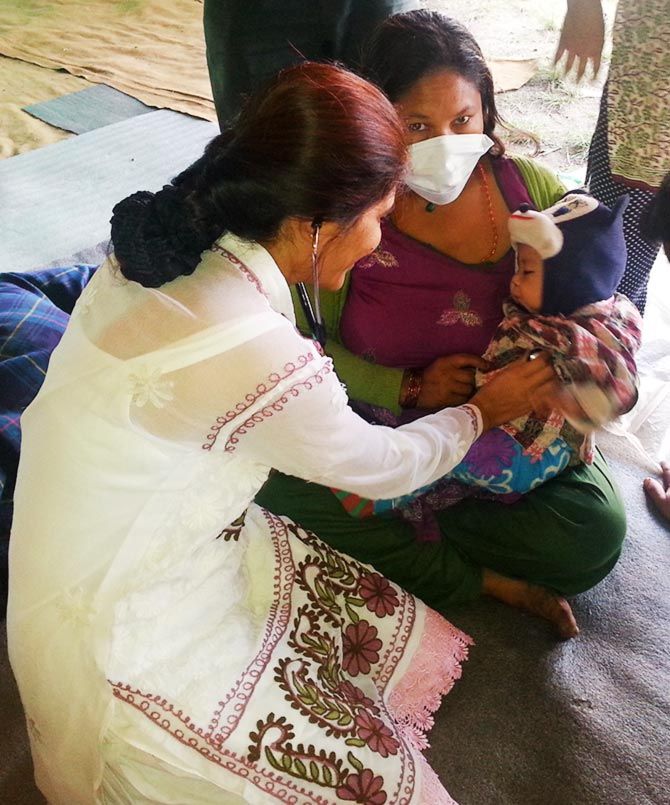
On April 25, 2015, a massive earthquake devastated Nepal, leaving more than 8,000 dead and injuring many more. Relief poured in from all parts of the world, as did rescue workers.
India was among the first nations to react to the crisis.
A team of 10 doctors from Karnataka went to Nepal to help with the relief efforts. Dr Vani Kori, an obstetrician-gynaecologist from Shivamogga, was part of the team.
Dr Kori, who is also the vice-president of the Indian Medical Association in Karnataka, describes how the team was able to assist the quake-ravaged nation.
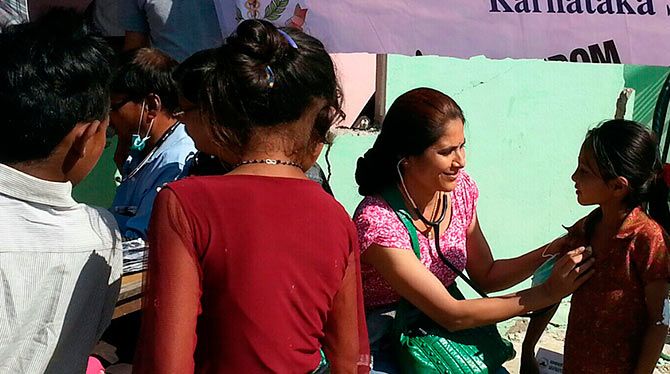
I am satisfied that I could help the victims in Nepal.
The Karnataka health ministry wanted to help and asked the IMA to send four volunteers to Nepal on Sunday, April 26.
They told us that 10 doctors were going from Karnataka -- six government doctors and four more from the IMA.
I had come from Shivamogga to Bengaluru for a meeting. I asked my daughter to send me some clothes and bought the rest of what I needed in Bengaluru.
We collected medicines and medical equipment. On Monday, April 27, we met Karnataka Health Minister U T Khader at 5 am. He told us, "Help as much as you can."
The government gave us 1,200 kilos of medicines.
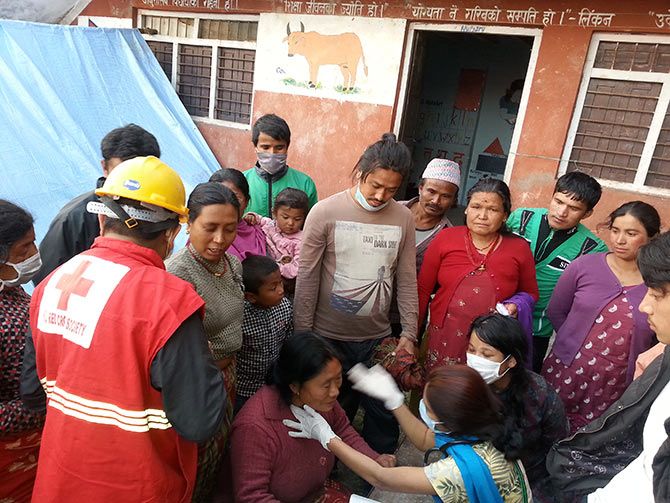
At 7 am, we boarded a flight to Delhi. We reached at 10.30 am. The flight to Kathmandu -- on Jet Airways -- was scheduled to take off at 1.50 pm. There were many Nepalese at the airport, waiting to go home.
Our flight was delayed. We finally boarded at 5 pm. My brother-in-law called to warn me that NASA said there would be another earthquake.
The flight finally took off at 7 pm.
At 8.30 pm, there were more tremors. We were above Kathmandu, but were not allowed to land. Our flight was diverted to Lucknow, where we landed at 10.30 pm.
At 11.30 pm, we took off again for Kathmandu. Again, we were not allowed to land due to lack of parking space. There were many military aircraft at the airport. We returned to Delhi. It was 4 am.
We were told we could go to Karnataka Bhavan in Delhi, but we stayed at the airport as we had our boarding passes. Our flight, now scheduled to leave at 1.50 pm, was delayed again. We finally reached Kathmandu at 7.30 pm on Tuesday, April 28.
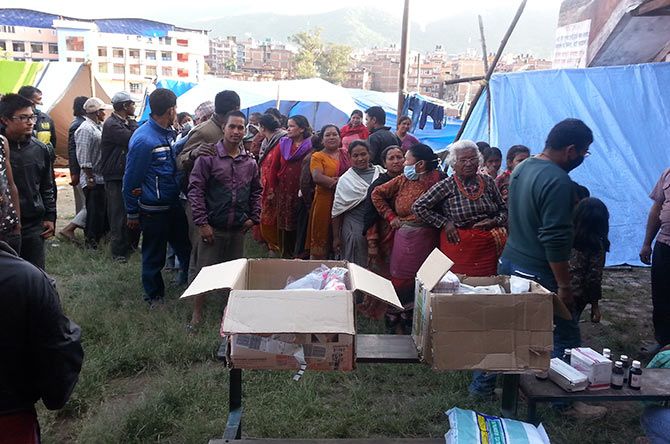
The Tribhuvan international airport was crowded and chaotic. People were looking for their baggage and for other people. We were told our baggage would reach the next day.
We took a cab from the airport to Kamalpokhra, where our stay had been arranged by the Indian government. It was just 15 minutes away. The hotel gave us food.
The next morning, we went to the Indian embassy and met Ambassador Ranjit Rae. The embassy was very crowded. Our people trying to organise help. Thirty doctors from Maharashtra were there with their paramedical team.
Dr Thakur was the man in charge at the embassy. We told him our medicines would arrive by 5 pm.
We then went to the Dharahara Tower area. There is a huge army maidan there where 400, 500 tents had been put up.
We had our stethoscopes and some medical equipment with us so we saw a few patients. Soon, we got a call from the embassy. Our baggage and medicines had arrived. We collected some essential medicines, left the rest at the airport and returned to the Dharahara Tower area.
We picked up the remaining medicines later.
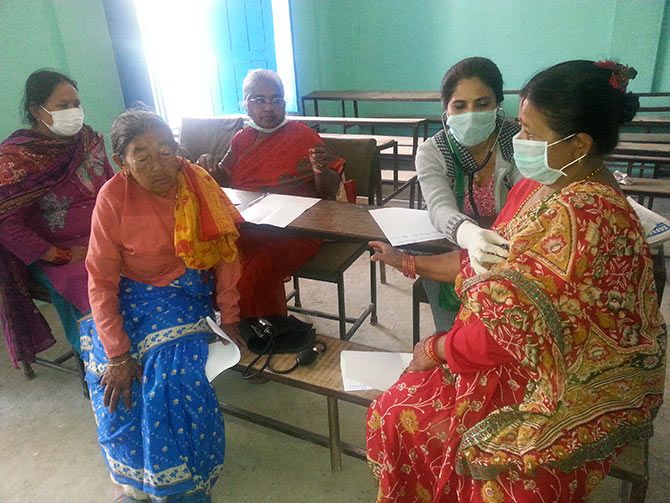
Most of the people we treated had minor injuries. The severely injured had been shifted to hospitals.
Many of the people we saw, particularly small children, were dehydrated. We shifted them to hospitals.
The local volunteers were very helpful, particularly a Mr Anand.
In the night, we returned to our hotel.
There was no connectivity. We had two local SIM cards that sometimes worked. I was trying to contact home when I felt tremors.
We came down as we were on the third floor. Once the tremors stopped, we went to bed.
The first thing we did on Thursday, April 30, was to go to the Indian embassy. They gave us a letter to say we were officially working there. The Nepal government also gave us a letter. The embassy gave us two buses.
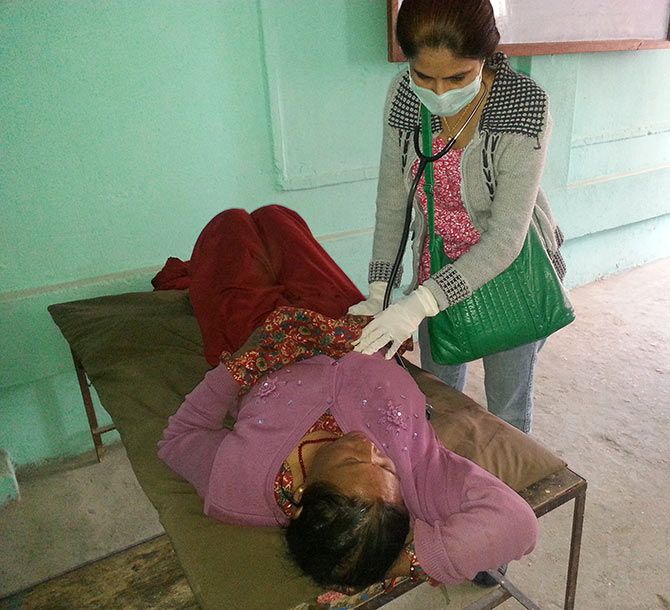
We were supposed to go to Gorkha district but the drivers said we could not go there. We went to the University hospital at Kathmandu instead. The situation was very bad. The Red Cross had put up tents as well.
I went to the obstetrics department. There were many patients there. Volunteers were distributing food. We started helping with sutures, dressings, intravenous drips and injections.
It is very bright in Nepal at 5 am; by 5 pm, it starts getting dark. We were at the hospital till 6.30 pm. We did not realise how fast the day had ended. I have no idea how many patients we treated; we never counted.
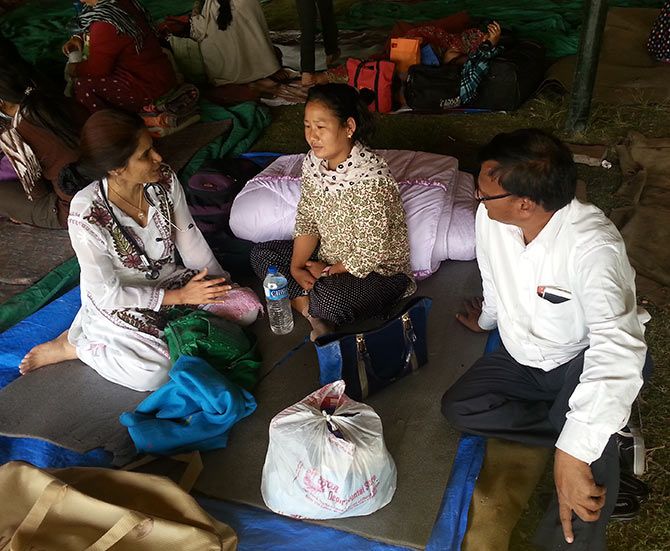
The next day, our orthopaedicians started doing surgeries; we prepped the patients for them.
In the afternoon, we went to Bhaktapur, which is on the outskirts of Kathmandu. It is only five to seven kilometres away, but it took us one-and-a-half hours to reach there.
The roads, many of which were narrow, were in bad condition; buildings on either side had collapsed. We walked over ruins to reach the people who were staying in crowded tents. Local volunteers carried our medicines for us.
We sat on bricks and treated patients. The people were suffering from blunt trauma. They were scared that there would be more tremors and needed a lot of counselling.
We worked there till 6 pm. It took us three hours to reach our hotel.
At around 3 am, the dogs started barking and the birds started screeching. There was a tremor. Later, we were told it had registered 5.1 on the Richter Scale.
After that, we could not sleep. There were two more tremors at 4 am and 5 am.
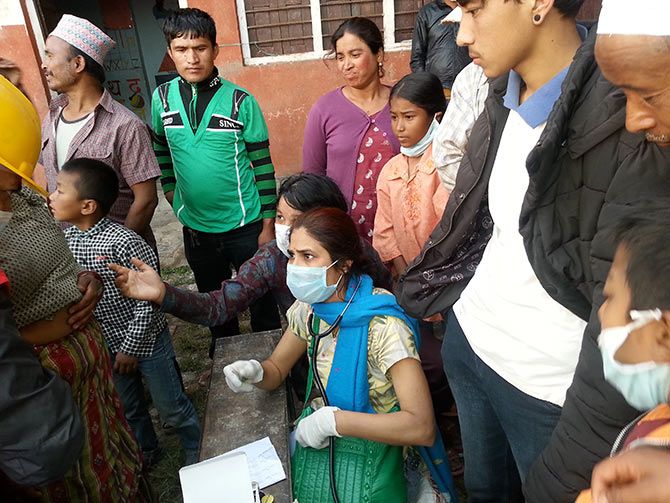
On Saturday, we met Mr Rajkumar Sah from the Federation of Nepali Chambers of Commerce and Industry. He has his own Ayurveda hospitals. He took us to Joharmahakal. We travelled for one-and-a-half hours by bus and then walked uphill for 45 minutes to reach this place.
There were hundreds of patients there.
Mr Rajkumar had also brought food and supplies; the people were happier with the food than with the medicines. Our medicines had been carried by volunteers who were always there to help.
We started treating patients.
I examined some pregnant women. They were frightened that their unborn child would be affected by the earthquake. I did my best to reassure them.
We were there the whole day.
Our driver said we must return before dark and so we left at 5.30 pm.
On the way back, we saw a camp and stopped. There were heaps of dead bodies being cremated and the volunteers wanted face masks. We gave them enough masks.
It was disheartening to see so many bodies.
It was 9 pm by the time we reached our hotel.
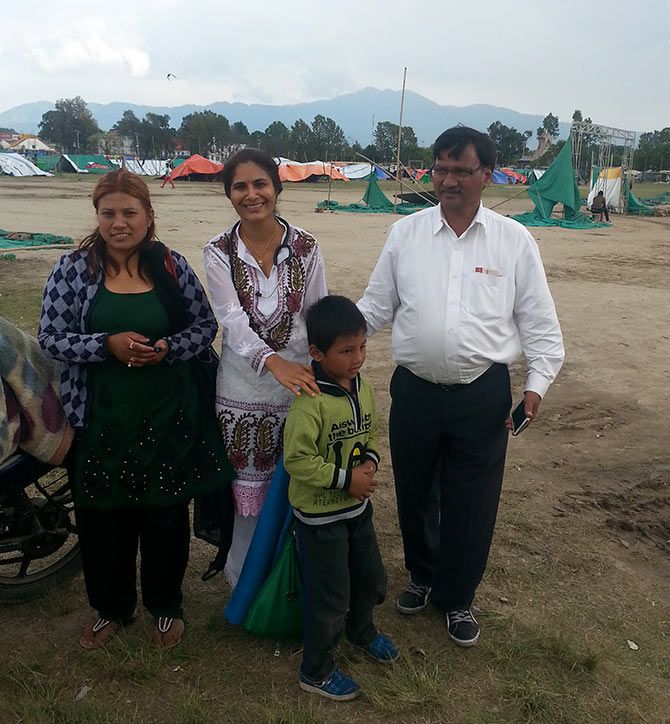
At 8 am the next day, we left for Ramkot, which was 25 kilometres away. It took us three-and-a-half hours to reach there. Mr Sah took us to a school where a medical camp had been organised. We worked the whole day along with the local doctors.
At 4 pm we visited the Jwalamukhi temple.
Locals said there was an old lady who was sick. Her home was at the top of a hill. Two of our doctors went up to help her; they treated other patients there as well.
We were told there were enough doctors available locally to treat more patients so we returned to our hotel by 9 pm.
I was to return on Monday, May 4.
It was not easy to get a ticket. Our health minister's office got me a ticket to fly out at 10 am by an Air India flight.
At 7 am, there was another tremor. The locals told us it was the 154th tremor since the earthquake.
After landing in Delhi, I took a flight to Bengaluru from where I boarded a bus to Shivamogga. I reached home at 1.30 am.
The Nepalese are a courageous people. They said they will build a new Nepal.
Dr Vani Kori spoke to A Ganesh Nadar/Rediff.com











 © 2025
© 2025